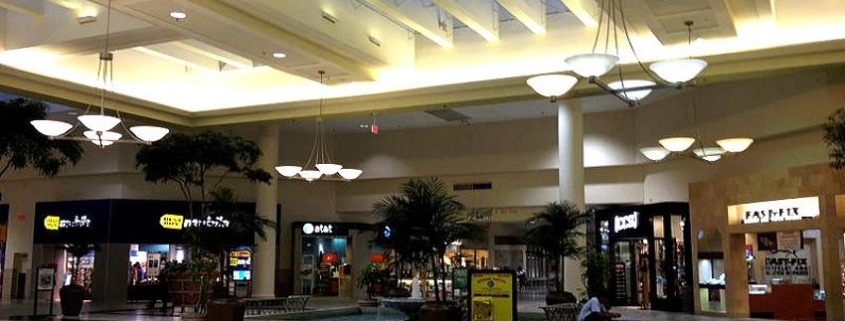Boynton Beach Mall Redevelopment Plan Chops Retail, Adds Housing And Offices, Including 65,000 Square Feet Of Medical
A plan to redevelop Boynton Beach Mall by owner Washington Prime Group was revealed this week and it halves retail space at the 34-year-old mall, adding multi-family housing, a hotel, and offices.
The master plan and rezoning request for the 116-acre site was filed with the Boynton Beach City Commission, which gave initial approval, but meets again on the plans Jan. 21.
The redeveloped mall would include a 400-room hotel, 65,000 square feet each of medical office space, and general office space, and 35,000 of new restaurant space, according to the plan filed. The redevelopment would happen over five phases, with the first phase removing the former Sears buildings and adding a 400-unit apartment building accodring to Washington Prime.
The Boynton Beach Mall once had tenants including Burdines, JCPenney, Jordan Marsh and Lord & Taylor. But, like other malls facing less in-store shopping and an increase in online shopping by consumers, retail tenants have dwindled over the years, with new types of tenants coming in.
“According to city documents, 30 percent of the mall is now vacant, and its proposed redevelopment would not only stabilize it, but make it a desirable destination once again,” said Bonnie Miskel, a lawyer representing primary mall owner Washington Prime.
In its proposal for redevelopment, Washington Prime stated that the current use of the property as an aging mall is in steady decline as it no longer meets the needs of the community and is slowly becoming a source of blight in the city. Occupancy at the mall has dropped by 11.5 percent between 2015 and 2016, according to documents submitted to the city to justify rezoning.
The proposal would reduce the existing mall square footage for retail from 1,034,745 about 1 million square feet to 482,750 square feet, and build separate, mixed-use buildings with retail use on the 1st floor and residential units above. Developers also would add up to 1,420 residential apartments on the site, along the north end and southwest side of the mall property, and inside the new mixed-use buildings.
But some Boynton Beach residents expressed concerns on the NextDoor app about mounting traffic off Congress Avenue near the mall and that mall redevelopment plans didn’t seem to include any new entertainment venues for the community, such as a park, bowling alley or sports center.
“The redevelopment would include public spaces for events and retail space that could include experiential-type tenants,” Miskel told commissioners.
The plan doesn’t have an impact on Macy’s and JCPenney, the two major department stores remaining at the mall, which are owned separately, and Christ Fellowship Church, owner of a former Dillard’s department store space in the mall.
Boynton Beach Mall is not the only mall in South Florida looking to add residential housing. Apartments are planned at Coral Square Mall in Coral Springs and at the former Fashion Mall in Plantation.
Source: SunSentinel





